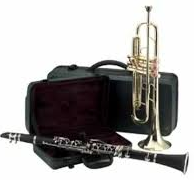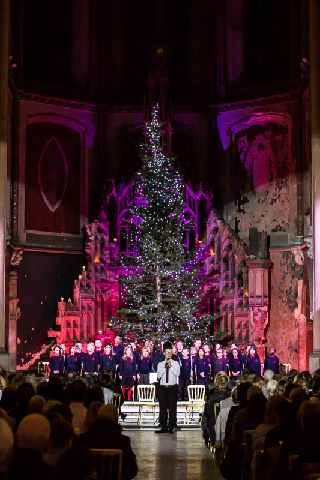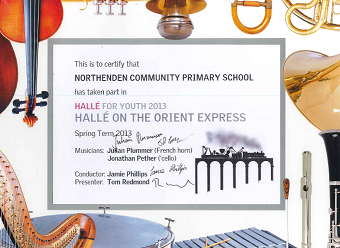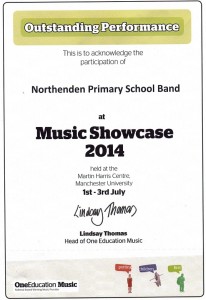|
Expectations of each year group
By the end of each year group, we expect the children to be able to:
Year 1
- use their voice to speak, sing and chant clearly
- use an instrument to perform
- clap short rhythmic patterns
- make different sounds with voice and untuned instruments
- repeat short rhythmic and melodic patterns
- make a sequence of sounds for effect
- say whether or not and why they like or dislike a piece of music
- distinguish sounds of different instruments
- represent moods in their music, e.g. a “happy” sound, a “peaceful” sound
- take turns and follow instructions and about when to play and sing
Year 2
- sing and follow a melody
- perform simple patterns and accompaniments, keeping a steady pulse
- play simple rhythmic patterns on an instrument
- sing, clap or play an instrument with increasing and decreasing tempo and dynamics (soft/loud)
- order sounds to create a beginning, middle and an end to a short piece of music
- create music and sounds in response to different stimuli, e.g. drama, a picture, a scene
- choose sounds and appropriate instruments which create an effect, e.g. thunder, rain
- use and understand symbols to represent sounds (simple graphic scores)
- make connections between notations and musical sounds
- listen out for particularly things when listening to music, e.g. changes in instrument or dynamics
- comment on and improve their own work
Year 3
- sing a tune with expression and accurate pitch
- play clear notes on an instrument, e.g. play a simple pattern or melody on a xylophone without error
- use different elements, e.g. tempo and dynamics, together
- create and play repeated patterns with different tuned and untuned instruments
- compose simple melodies and accompaniments
- combine different sounds to create a specific mood or feeling
- use musical and other appropriate words to describe a piece of music
- use musical words to describe a piece of music and what they like and do not like about it
- recognise the work of one or more famous composers
- improve their work and explain how it has been improved
Year 4
- perform a distinct part in a group performance, including starting and finishing in the right place
- sing songs from memory and with accurate pitch
- improvise using repeated rhythms in a solo or group performance
- use notation to record and interpret how music should be played
- explain the effect of and use silence in a piece of music or a part in a piece
- identify the character of a piece of music
- identify a describe different purposes of music and how music is used
- begin to identify the style of work of different composers and musicians
- have an appreciation of performance to audience – preparation, behaviour, presence, applause, etc.
- use ICT to create musical compositions or effects
- understand the key features of music from different cultures and traditions, e.g. steel pans, djembe drums
- learn to play the recorder
- start to learn standard musical notation
Year 5
- sing with expression, using appropriate style and breathing to control the voice
- maintain a separate part in a song or a instrumental piece, e.g. a xylophone or percussion part
- improvise within a group performance – changing rhythm, accompaniment or melody appropriately
- choose and change dynamics, tempo and other elements for best effect
- change sounds or sections of a piece to change its effect, e.g. loud vs soft, slow vs fast, instruments
- use notation to record groups of pitches, e.g. chords
- describe, compare and evaluate music using musical vocabulary
- explain why a piece of music or performance is successful or unsuccessful
- improve their own work and suggest ways in which others’ work could be improved.
- compare the work of different composers and musicians and explain preferences
- know about the different families of instruments and how they work/sound, e.g. strings, brass
Year 6
- sing in harmony, confidently and accurately
- perform a part in a song or a piece of music confidently and accurately
- perform confidently with a clear sense of purpose, venue, audience and occasion
- take the lead in a performance (e.g. in a samba or as conductor or as a soloist)
- use a variety of different musical devices, e.g. melody, chords, rhythms
- compose and perform pieces of music with different structures, e.g. ABA, ABCD, Rondo, etc.
- analyse features within a piece of music, e.g. choice of instrument, tempo
- use ICT software to create a piece of music with a combination of instruments, rhythms and melodies
- ecord their music so that it can be played back or made available for publication, eg. on a CD
- describe the features of different types of music, including those from different periods in history
- compare and contrast the work and impact of different composers, musicians and musical traditions, e.g. The Beatles, Electronic music
|
| Instrumental Tuition
Following their introduction to the recorder and staff notation, the school offers children in Year 4 and above the opportunity to learn a musical instrument, either woodwind (flute and clarinet) or brass (trumpet, euphonium, trombone). These lessons take place during the school day and are taught by specialist music tutors. The school charges for these additional lessons at a rate determined by the Governing Body.
|
 |
|
The Christie Charity Concert, December 2014 (and December 2013, 2012)
In December 2014, our school choir had, for the third consecutive year, the opportunity to play a part of the annual Christmas Concert in aid of the Christie Charitable Trust. This is a prestigious event performed in the beautiful setting of Manchester Monastery, Gorton, in front of an audience of about 500 people. Our school choir had the opportunity to perform with other musicians and singers. We are very proud to be part of these concerts and to help raise funds for The Christie Hospital in this way.
Here we are performing with one of the evening’s soloists.

|
|
Hallé for Youth – 2013
In 2013, our then Year 5 pupils had the opportunity to work with musicians from the world-famous Hallé Orchestra and perform on stage at the Bridgewater Hall with the whole orchestra at one of their Hallé for Youth concerts. Our audience was 2000 other children and staff from schools across Greater Manchester. The concert theme was “Hallé on the Orient Express” and featured music, including our own composition, of music from the countries featured on the journey of the great Orient Express railway journey.
Here is our certificate from that project.

|





